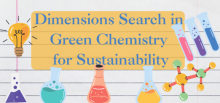Analytical Chemistry
Applications of Lewis Acidic [ZnCl2]2[ChCl] Deep Eutectic Solvents (DES) in the Synthesis of Unsymmetrical Ethers via Dehydrative Cross Etherification of Alcohols
Unsymmetrical ethers are generally synthesized via the Williamson ether method, but the unwanted formation of symmetrical ethers plus the basic and harsh conditions of the route pose a synthetic challenge. Other methods employed in the synthesis of unsymmetrical ether require the use of toxic mineral acids, and requires high catalyst loading which limits their large-scale application. Dehydration of alcohols in the presence of base-metal catalyst has, however, recently offered the greenest approach to synthesize unsymmetrical ethers, leaving water as by-product.
An Assessment of Per-and Polyfluoroalkly Substances in the Food Packaging of Local Manufacturers and Retailers of International Products in Trinidad and Tobago
Per- and polyfluoroalkyl substances (PFAS) are a diverse group of synthetic compounds widely used for their dual hydrophobic and lipophobic properties. They comprise more than 4700 CAS-registered compounds according to the OECD and have been used intentionally in nonstick, grease-and waterproof, and stain-resistant consumer products, particularly food packaging materials. PFAS are inherently persistent, and many are mobile, bio-accumulative, and toxicity to a wide array of organisms, making them emerging contaminants of concern.
A Comprehensive Analytical Approach and Potential Solutions in Understanding Microbial Transformation of Legacy PFAS in Wastewater
Significant increases in the presence of organofluorine compounds, especially per- and polyfluoroalkyl substances (PFAS), have been reported in the various environmental compartments. Many of these compounds, including their precursors and metabolites, remain challenging to detect and quantify using current analytical methods. PFAS have the potential to undergo metabolic transformation processes under biotic conditions in the presence of suitable microbial communities and under varying environmental conditions, each with its unique metabolic pathways. Yet microbial degrada
Systematic Study on the Design of Supramolecular Deep Eutectic Solvents (SUPRADES) for the Extraction of Bioactive Compounds
his research focuses on the design and optimization of supramolecular deep eutectic solvents (SUPRADES) for the extraction of bioactive compounds and the exploration of potential applications. SUPRADES represent a novel subclass of deep eutectic solvents (DES) that could have a significant impact on green chemistry due to their enhanced inclusion properties, offering a promising alternative to conventional solvents. They may provide higher selectivity and efficiency in extracting different families of compounds.
Coronazyme Catalysis Enhanced by Chemical Interfacial Damping
In this research, we synthesized DNA@AuNR coronazymes with gold nanorods (AuNRs) coronated with DNA for superior catalytic efficiency. Furthermore, the localized surface plasmon resonance (LSPR) excitation of AuNRs facilitates plasmon-responsive photocatalysis.
Colorimetric sensor array: Rapid and sensitive approach for detecting and identifying emerging nanomaterial contaminants
Mass spectrometry-based methods for analysis of ionic liquid species
The synthesis and use of ionic liquids (ILs) has increased steadily since their inception, driven by their distinctive useful properties. In cases where they replace harmful volatile organic solvents they are often considered “green” and in cases where they are recyclable, they may be considered sustainable. However, many of the properties—such as low volatility and stability—that make them attractive for applications also make them potential persistent contaminants, should they be released into the environment.
Electrochemical sensors based on reduced graphene oxide (r-go) for environmental monitoring
The innovation in this study lies in enhancing conventional sensors through the integration of advanced materials such as graphene and its derivatives. These materials, derived from carbon, a widely abundant, renewable, and sustainable element, exhibit exceptional properties, including high molecular adsorption capacity, superior electrical conductivity, and remarkable mechanical strength. Their multifunctionality not only enhances sensor performance but also promotes material efficiency by significantly reducing the resources required for production.
Green Analytical Chemistry Short Course at PittCon
This short course is designed to provide participants with an understanding of the principles of green chemistry and their application to chemical analysis. The course will begin by discussing principles of green chemistry and engineering as a supporting pillar of sustainable development. Metrics for evaluating the “greenness” of analytical methods are presented. Solvent selection and alternative solvents are discussed. Application of green principles to chemical separations and spectroscopy are introduced. Case studies will be presented to exemplify these green chemistry applications.
Pagination
- Page 1
- Next page

